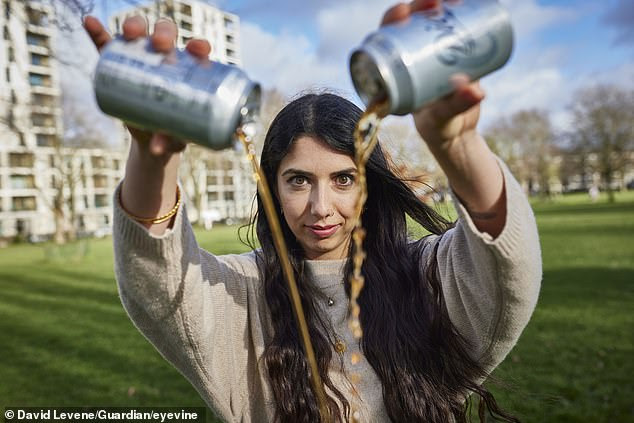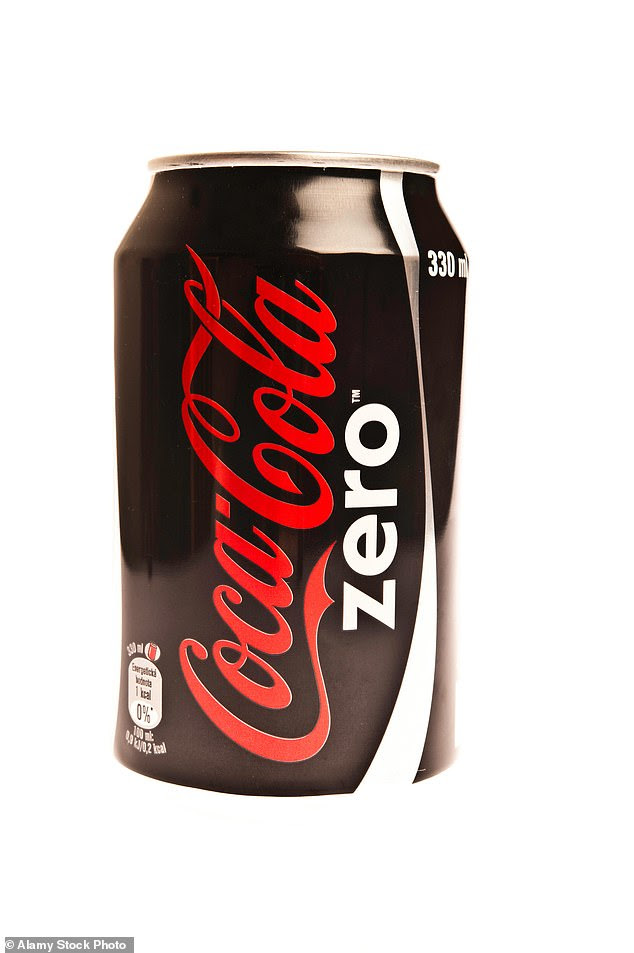| Back to... |
|
 | |
| Share Our Stories! - Click Here | |
Can Aspartame make you fat and cause cancer? | |
| Dr. Betty Martini, D.Hum. 6-23-22 | |
|
https://www.dailymail.co.uk/ news/article-10929933/Can- sugar-free-drinks-make-fat- cancer.html Yes to both. Aspartame breaks down to diketopiperazine a brain tumor agent and caused brain tumors and brain cancer in original studies, and other cancers. It has been banned twice. It not only caused cancer in original studies but Dr. Adrian Gross, one of the FDA scientists who investigated it, told the Senate aspartame violated the Delaney Amendment because of the cancer, 8/1/85. Dr. Morando Soffritti of the renowned Ramazzini Institute did three studies showing aspartame to be a multipotential carcinogen. So did Harvard on humans, same thing. It's all on my web site. There were six class actions on aspartame and obesity. No matter how much scientific peer reviewed research you gave the judges they would not allow the studies to be heard,. When you have enough power to stop class actions from being heard its demonic. Dr. Ralph Walton agreed to be the expert in a lawsuit in New York. Again the court would not allow it to be heard. Andrew Sacks in Pennsylvania was one of the attorneys in the original class actions on aspartame and obesity. The Bressler Report http://www.mpwhi.com/complete_ bressler_report.pdf lists some of the fraud. The information from the FDA saying aspartame causes birth defects, was deliberately removed so they wouldn't have to add a pregnancy warning allowing an epidemic of autism and other birth defects like spina bifida and cleft pallet. It took 8 years to find these studies and return them to the Bressler Report as you see. Had this not been done, aspartame would never have been approved. In fact, first in 1975 the FDA told Searle they could not market aspartame until they were done with their investigation having been dissatisfied with studies they had seen. They kept on selling it according to a neighbor of mine who built the aspartame plant in Augusta, Georgia. FDA revoked the petition for approval and G. D. Searle sued. They hired Don Rumsfeld to get it on the market and he said he would call in his markers, and that he did. He got President Ronald Reagan to write an executive order forbidding the FDA Commissioner from signing the revoked petition into law. As to heart conditions, of course its responsible of millions of cases. According to Dr. H. J. Roberts, the late expert on aspartame who wrote the medical text, "Aspartame Disease: An Ignored Epidemic" it causes an irregular heart rhythm, interacts with all cardiac medication, damages the cardiac conduction system and causes sudden death. Its now being added to drugs without being labeled which is against the law. It must contain a PKU warning for phenylketonurics who can't metabolize the phenylalanine. In fact, it was in a medication given to me in the hospital and I immediately had a heart attack. Don't be fooled by misinformation. After 40 years its all down in medical texts. It's completely explained in "While Science Sleeps: A Sweetener Kills" by Dr. Woodrow Monte and also in "Double Blind: Science, Corruption & the Diseases of Civilization" by Dr. Ralph Walton and many more. Notice when you look for books on aspartame the titles will have things like epidemic, kills and corruption. In Dr. Monte's text there is a whole chapter on aspartame and autism. Over the years I've had several calls from Ft. Detrick where you make biochemical warfare weapons that this is where aspartame was studied. Read it from the renowned Ecologist: http://www.mpwhi.com/ ecologist_september_2005.pdf who started off with "Once upon a time there was a biochemical warfare weapon". Originally it was made in Germany according to a whistle blower who said she saw the aspartame file for sale by the German police just after the Berlin Wall was removed. She said the information was so strong it was hard to believe until she saw my web site and the reporting was identical to what she had read. It has been spelled out in thousands of case histories over the last three decades. Aspartame is so bad that even the National Soft Drink Association who changed their name to American Beverage confessed it was not safe which is even in the congressional record: https://rense.com/general96/ pepsi.htm They refuse to discuss it. A representative from American Beverage testified on Proposition 65 and aspartame 6 years ago. He had the gall to walk away from the podium saying out loud "there is a Delaney Amendment" as if it passed. The Delaney Amendment makes it illegal to allow any residue of cancer-causing chemicals in foods. Dr Adrian Gross mentioned above concluded in his testimony to Congress that given the cancer-causing potential of aspartame, how would the FDA justify its position that it views a certain amount of aspartame as constituting an allowable daily intake or safe level of it? Is that position in effect not equivalent to setting a tolerance for this food additive and thus a violation of that law? And if the FDA itself elects to violate the law, who is left to protect the health of the public? Congressional Record SID835:131 (8/1/85)" Many physicians have said to me over the years: "We know aspartame is bad but we just don't know why." The reason is aspartame is a deadly addictive excitoneurotoxic, genetically engineered, carcinogenic drug, adjuvant and teratogen that interacts with drugs and vaccines masquerading as an additive. When they maybe write a prescription for Coumadin, and the patient is taking aspartame, they have no idea that the Coumadin is not going to work. They have no idea its a drug and not an additive. They are not looking for these problems. Here is the hospital report making them responsible if they give you aspartame. Notice the entire chapter on aspartame and drug interaction from Dr. Roberts 1000 page medical text tells you what is going to happen: Dr. Roberts said one of the things that aggravated him was that aspartame causes gastrointestinal disease and drugs to treat these problems also contain aspartame. Yes, it even happened to me in the hospital. They gave one of these prescriptions to me and I stopped breathing. Never go to the hospital without this report: http://www.mpwhi.com/ aspartame_hospital_form.htm I cautioned a physician at a hospital when he prescribed one of these aspartame drugs. He decided to check and returned saying, "I'm so sorry, you can never ever take a gastrointestinal drug. Every generic has aspartame in it." I've stopped breathing four times in hospitals because aspartame was in drugs, and I'm one who has been exposing it for over 3 decades. It must be banned. I see this mentioned in this article. Roger Williams in Parliament attempted to get aspartame banned several years ago. Even Dr. Ralph Walton went to England to testify and discusses it in his medical text mentioned above. It didn't pass and they tried to stop him from saying everything in the time allotted but Williams definitely mentioned it's a biochemical warfare agent. Aspartame was approved in England through a business deal and the Guardian told the story. At that time they were extremely upset. They had a chance to rectify the problem and didn't. Pass it on and particularly make sure mother's know to never allow a child to touch it. Remember the Trocho Study showed the formaldehyde converted from the free methyl alcohol embalms living tissue: http://www.mpwhi.com/ formaldehyde_from_aspartame. pdf If you don't want your child pre-embalmed never allow them to have aspartame. (Aspartame, NutraSweet, Equal, Benevia, Neotame, Canderel, E-951, Spoonful, etc.) The FDA had promised Dr. John Olney who tried to prevent its approval even though Rumsfeld got it approved, and through political chicanery, they would see to it that no child ever had it. Famous last words. St. Luke's Children's Hospital is full of children who are there because of aspartame birth defects. As one employee told me "these babies with brain tumors are here because their mother's used aspartame during pregnancy." Dr. Betty Martini, D.Hum, Founder Mission Possible World Health Intl www.mpwhi.com 770 242-2599 Also www.wnho.net and www.holisticmed.com/aspartame Is your sugar-free diet drink actually making you fat... or could the artificial sweeteners actually give you cancer?
By EVE SIMMONS FOR THE MAIL ON SUNDAY For anyone keeping an eye on their weight, it's an easy win: switch regular Coke, Pepsi or Fanta for diet versions which have all the fizz and sweet taste but none — or barely any — of the calories or tooth-rotting sugar. And with consumers always looking for healthier options in the supermarket, these drinks are soaring in popularity. Today, two-thirds of the fizzy drinks we buy are low or zero-calorie versions made with artificial sweeteners such as aspartame, acesulfame K, sucralose and saccharin. A wave of trendy new brands, such as Dash, Nocco and Remedy, have joined the more familiar labels jostling for fridge space, and you're as likely to see them sold in gyms and health-food stores as you are in supermarkets and corner shops. Meanwhile, other low or no-calorie foods are having their moment, with zero-sugar ice creams, cereal bars and yogurts, also laced with artificial sweeteners, all trading on similar health promises.  Sirin Kale, 27, from London, pictured, was addicted to Diet Coke, spending £500-a-year on the soft drink So claims that surfaced — or rather, resurfaced — last month, warning that consuming these products might make us more likely to pile on the pounds, made alarming reading. According to weight-loss nutritionist Susie Howe, artificial sweeteners hijack our hunger hormones, making us want to eat more. And Howe is not alone in her concerns. Over the past two years, a number of studies have come to similar conclusions, with scientists suggesting that the additives, which are up to 200 times sweeter than sugar, prime our tastebuds to crave sweet things and eat when we're not hungry. In March 2020, a group of scientists from Yale University found that consuming drinks containing sweeteners might increase the amount of sugar we absorb from foods eaten at the same time. And earlier this year a French study involving more than 100,000 people found those who consumed lots of low-calorie sweeteners, including those added to low-cal ice cream and sugar-free sweets, were more likely to be obese and more likely to suffer obesity-related cancers, such as breast and liver cancer. Such is the worry that some British scientists are calling for the Government to ban one of the most widely used sweeteners, aspartame — which is found in Diet Coke and Coca-Cola Zero Sugar — because of concerns about its 'adverse effect  Such is the worry that some British scientists are calling for the Government to ban one of the most widely used sweeteners, aspartame — which is found in Diet Coke and Coca-Cola Zero Sugar — because of concerns about its 'adverse effects' 'The accumulation of data so far suggests that, at best, food containing artificial sweeteners is unhelpful for weight loss and, at worst, they are counter-productive,' says Erik Millstone, emeritus professor of science policy at the University of Sussex, who is backing the proposed ban. 'There is strong evidence that sweeteners act as an appetite stimulant. I have scrutinized most of the studies on potential harms of many sweeteners, and I have yet to come across one that I would give a clean bill of health.' Yet the NHS does not support this view. The official line is that there's 'little evidence' from studies to show sweeteners cause weight gain in the long term. Meanwhile, dieticians who work with patients in GP surgeries and hospitals continue to recommend diet drinks to those who need to slim down. So what's the truth? Before we can answer that, it's important to understand what artificial sweeteners are. Broadly speaking, they are man-made chemical compounds — although, in many cases they are derived from natural sources — that stimulate sweetness taste receptors on the tongue, just as sugar does. Importantly, they are many hundreds of times sweeter than sugar, so only minute amounts need to be used, and most are indigestible — hence, we absorb few or any calories from them. Aspartame is made up of amino acids extracted from eggs and milk, while acesulfame K, often mixed with other sweeteners due to its slightly bitter taste, is made from potassium salt. Others, such as sucralose, which is found in table-sugar substitute Splenda; polyols, used in sugar-free gum; and saccharin, found in Sweetex tablets, are less commonly used and make up a smaller fraction of the total sweeteners most people consume on a daily basis. Since their widespread adoption by the food industry in the 1960s, they have been dogged by health-scare stories.  Aspartame when eaten, the compound is broken down and releases substances including methanol and formaldehyde, which are known carcinogens. But this doesn't mean aspartame causes cancer Aspartame, specifically, has been a target. When eaten, the compound is broken down and releases substances including methanol and formaldehyde, which are known carcinogens. But this doesn't mean aspartame causes cancer. Dr Duane Mellor, a dietician with the British Dietetic Association and a nutrition researcher, says: 'The amount of methanol that is released when you drink a can of Diet Coke is about five to ten per cent of the amount that would be produced after eating an apple.' It is caffeine, not the sweetener that gets people hooked...Sirin Kale spent 27 years 'addicted' to Diet Coke. At one stage, the 32-year-old journalist from London was glugging up to seven cans a day, spending roughly £500 a year on her habit. Each morning she'd 'pad to the kitchen' for a swig before starting her day.
|